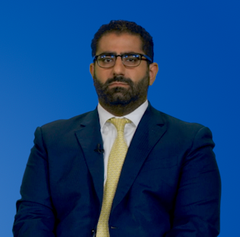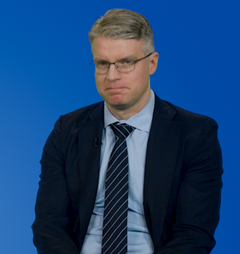
Patient Eligibility for Utilizing Anti-CTLA4-Containing Regimens
A conversation on patient tolerance of CTLA-4 immunotherapies, alongside an exploration of treatment-related adverse reactions is discussed by a panel of experts.
Episodes in this series

Mark Socinski, MD: What we’ve seen is an increasing number of approved regimens. Now we have a couple of 4-drug regimens that are out there. [Some] of the newer drugs on the scene are the anti–CTLA-4 agents that we had. When you think about that particular group of drugs, what are your concerns about patient selection and toxicity?
Martin Dietrich, MD, PhD: Well, first is to establish a need for these drugs. There is [a] certain subgroup of patients, the patients [with] PD-L1–negative [disease], who may have intrinsic resistance mutations to immunotherapy responses. In a PD-1–centric world where this is an important factor, do we expect any additional usefulness of these medications as a first step? And for me, the experience is that older patients seem to be tolerating these immunotherapies quite well. They don’t seem to be mounting these aggressive responses as much as you would expect in 40-year-old patients [with] melanoma. So the experience overall with CTLA-4 has been better, and we certainly have seen lower doses of our 2 approved CTLA-4 agents going into lower doses and less frequent applications than in the second approved regimen, also with a limited number of infusions. So I do think that CTLA-4 has a role that is not limited by toxicity, but if a patient already has a poor performance status, a potential adverse effect may be the end of their treatment. On the flip side, and I always think of these adverse effects as a necessary evil whether it is cellular-based therapies, bispecific, or even combination immunotherapies, these immune responses that are manifesting oftentimes as autoimmune adverse effects seem to be tipping points for immune activation. I’m conflicted about looking at them only [as] negative. This is not the typical chemotherapy off-target toxicity, and they are at some point needed. And we’ve seen across [findings from] multiple studies that their occurrence is associated with significantly improved outcomes. So it’s a direction that we have to pursue.
Mark Socinski, MD: We just published a paper in JAMA Oncology with a review of the EMPOWER trials, 3 of the EMPOWER trials, in which having at least a low-grade immune-mediated adverse reaction did improve survival. I was just preparing for our ASCO [American Society of Clinical Oncology] review and I noticed that in the CheckMate 9LA update at [the] ASCO [Annual Meeting in Chicago, Illinois] this year, they showed a survival curve for those patients who discontinued treatment [because of] a treatment-related adverse event. They had better survival. To your point, it may be a sign of an activated immune system. It’s overshooting a little bit, obviously, but that’s what we want. And it does suggest that having a little immune-related event is not necessarily such a bad thing.… How often are you finding yourself having to stop because of immune-related adverse reaction?
Martin Dietrich, MD, PhD: Well, it is about a quarter of patients in the combination setting, so it’s not an infrequent occurrence. But again, I console myself with the expectation that those are patients who may have [experienced transformation] from the humoral stimulation by immunotherapy into a cellular-based maintenance response. And the data are consistent across all different trials. So there’s not a lot of variability whether it’s a PD-1 agent alone or the combination more frequently, and the outcome improvement seems to be a consistent message across [findings from] different trials. We had 2 bispecifics approved in the past couple of weeks in the hematology space, where the autoimmune toxicities are substantially higher. That’s a practice concept that we’ll have to get used to if we want to elevate the long-term outcomes for treatment in the non–small cell lung cancer stage IV [space].
Transcript is AI generated and edited for clarity and readability.
Newsletter
Stay ahead of policy, cost, and value—subscribe to AJMC for expert insights at the intersection of clinical care and health economics.












